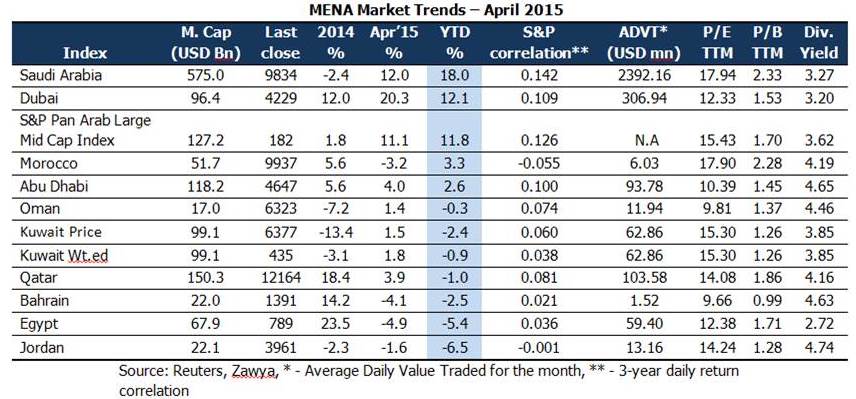
The Kuwait Financial Center "Markaz" recently issued its monthly market report, in which it deals with the performance of stock exchanges in the Middle East and North Africa region and global stock markets for the month of April.
The report indicated that the month of April was positive in the markets of the Middle East and North Africa in general, at a time when the price of Brent crude rose by 21.2%, and the geopolitical situation in the Middle East worsened. For its part, the Dubai market indices rose by 20.3%, and the Saudi Tadawul market by 12%, to be the highest gains. On the contrary, the Egyptian, Bahraini, and Moroccan market indices fell by 4.9%, 4.1%, and 3.2%, respectively. The Standard & Poor's index of Gulf markets closed in April at 127 points, recording an increase of 10.1%.
The report added that the Kuwaiti market indices rose slightly during the month of April thanks to the rise in the price of oil, and after the Capital Markets Authority announced reforms to bring market practices in line with international standards. The price of Brent crude jumped by 21% in April, achieving its best monthly gain in 6 years, due to the weak dollar value resulting from weak US economic data and the general feeling about the decline in the supply of oil. The situation in Yemen and the events taking place in Libya, which forced it to close the El Feel oil field, also contributed to the decline in supply. However, talks between world powers and Iran over a deal to restrict work on the nuclear program in exchange for sanctions relief are nearing their final stages. The easing of sanctions may increase the amount of supply in the market, which may push prices down.
Meanwhile, Markaz's report indicated that the positive profits achieved by companies and the rise in oil prices revived the Dubai General Market Index (DFMGI) in the month of April. The index broke the 4,200-point barrier, touching 4,229 points during the year. While the Saudi market rose on the back of high oil prices, despite the increase in production and the recent royal and ministerial reshuffles in the Kingdom. For its part, the Egyptian Stock Exchange was affected by the issue of imposing taxes on stock exchange dividends, but hopes for amendments to the new tax laws exist.
On the other hand, the volume of shares traded during last April increased by 66%. However, the value of shares traded slightly increased by 0.2% in most of the region's markets. The volume of shares traded in Abu Dhabi, Dubai and Bahrain increased by more than 150%. While the Dubai market witnessed a rise of nearly 160% in the volume of shares. As for the valuation, the profitability multiplier in the Oman, Bahrain and Abu Dhabi market witnessed a decrease of less than 11 times. With the possibility of increasing oil supply from Iran, it is necessary to wait until it becomes clear whether OPEC members will continue to stick to their current strategy.
The report indicated that the performance of preferred shares was positive, as almost all of them rose at the end of April. Shares of Saudi Arabia's SABIC rose 36% in April on the back of rising oil prices. While the 7% increase in Emaar Properties' profits in the first quarter contributed to a 25% increase in its shares. Likewise, the positive profits earned by the National Commercial Bank and Saudi Telecom boosted their shares by 11% and 16%, respectively.
Regulatory changes in the region
In an effort to improve the country's standing in the World Bank's Doing Business rankings, the UAE Securities and Commodities Authority has issued new laws to protect small shareholders and to make trading more transparent, including halting trading in companies' shares. The UAE ranked 22nd globally in the latest Doing Business report, which is the highest ranking in the Gulf, but it ranks 43rd in terms of protecting small investors.
In order to enhance the investment environment in the country and raise its classification to an emerging market, the Capital Markets Authority in Kuwait sought to bring its practices into line with international standards. The new plans will separate the settlement of trading operations from the central depository. It will also be equal in the period of time allowed for the transfer of ownership of securities between all investors.
After a long wait, the Saudi market, with a market value of $532 billion, will open its doors to foreign direct investment on June 15, 2015, which will allow qualified foreign institutions to purchase shares starting from that date. The final laws related to market opening will be published in the first week of May.

About the Kuwait Financial Center "Markaz"
The Kuwait Financial Center (KSC) "Markaz" was established in 1974 to become one of the reputable financial institutions in the Arab Gulf region in the fields of asset management and investment banking. The center now manages total assets of 1.08 billion Kuwaiti dinars as of December 31, 2014 (US$3.71 billion). Markaz was listed on the Kuwait Stock Exchange in 1997.
For more information, please contact:
Osama Zaid Al-MusallamMarketing and Public Relations Department
, Kuwait Financial Center Company “Markaz”
Tel: +965 2224 8000 Ext: 1819
Direct: +965 2224 8075
Fax: +965 2249 8740
[email protected]

